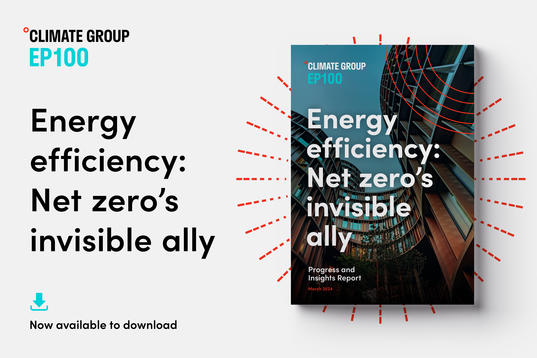- Businesses in Climate Group’s EP100 initiative have reduced their emissions by 395 million metric tonnes of CO2e to date; that’s more than the current annual emissions of the UK and Belgium combined.
- Energy efficiency is key to net zero, and by being more energy efficient, we will lower overall energy consumption and make the energy transition quicker and simpler, says Climate Group.
- “… we will not achieve our climate goals without such a strong push on energy efficiency, and of course business is central to this. That is why EP100 is so important,” Dr Brian Motherway, International Energy Agency (IEA).
Corporates are taking critical steps towards doubling the world’s energy efficiency by 2030, as agreed by many countries at COP28 – bringing global climate goals and energy security ever closer. This is according to the latest Progress and Insights Report from Climate Group’s EP100 initiative.
To date, corporate members of Climate Group’s EP100 initiative have reduced their emissions by 395 million metric tonnes of CO2e – that’s more than the current annual emissions of the UK and Belgium combined. Last year alone, members reduced 54.4 million metric tonnes of CO2e, equivalent to the emissions from the electricity use of 10.5 million US homes.
The need for global progress on energy efficiency, alongside ramping up renewables, was recognised atCOP28 – 123 countries committed to doubling the annual rate of energy efficiency improvement, from 2% to over 4% every year until 2030.
"We are at a historic moment for energy efficiency – for the first time ever it is a key outcome of COP in the form of a specific commitment to push for a doubling of global efficiency progress by 2030. The focus now is on action – and converting this unique moment into efficiency gains that lower energy costs, lower emissions and enhance energy security. As the IEA has stated, we will not achieve our climate goals without such a strong push on energy efficiency, and of course business is central to this. That is why EP100 is so important."
"We are at a historic moment for energy efficiency – for the first time ever it is a key outcome of COP in the form of a specific commitment to push for a doubling of global efficiency progress by 2030. The focus now is on action – and converting this unique moment into efficiency gains that lower energy costs, lower emissions and enhance energy security. As the IEA has stated, we will not achieve our climate goals without such a strong push on energy efficiency, and of course business is central to this. That is why EP100 is so important."
The new report, Energy efficiency: Net zero’s invisible ally, documents how 127 ambitious EP100 companies, spanning 157 markets, are improving their resilience, international competitiveness and energy security through energy efficiency. EP100 members have saved $1.6 USD billion in costs since the implementation of energy efficiency measures.
These measures include implementing a more efficient manufacturing and construction process, installing LED lighting, constructing more energy efficient buildings, taking on deep building renovations, and offering energy efficiency guidance packs to tenants to help improve resident energy use.
At the cutting edge, artificial intelligence (AI) enabled cooling and lighting systems can optimise building performance and comfort for owners and occupants, all the while reducing energy use at the same time, Climate Group says. AI can connect up all the climate-smart technologies in an energy efficient building, deciding when to run the heat pump or air conditioner, when to draw on rooftop solar because it’s sunny, or the batteries of EVs plugged into its charging points because it’s not. These integrated energy solutions, deployed in our homes, hospitals, offices and schools, reduce total energy consumption, cutting how much we need to spend on renewables and battery storage facilities.
“Energy efficiency is vital for the global energy transition. Without a reduction in our overall energy demand, the energy transition will be significantly more expensive and take much longer. Energy efficiency may be invisible, but a more sustainable built environment, energy security, and a net zero world will be instantly recognisable when achieved,” said Helen Clarkson, Chief Executive Officer, Climate Group.
The new report also shares how three EP100 members – NatWest, Nippon Telegraph and Telephone, and Schneider Electric – hit their EP100 energy efficiency targets in 2023. NTT and Schneider Electric have doubled their energy productivity from 2018 and 2005 baselines respectively, while NatWest has implemented an energy management system and increased its energy productivity by 40% from a 2015 baseline.
“As energy efficiency is in the spotlight, it’s unlocking our global climate goals. Energy efficiency in our homes, hospitals, offices and schools, reduces our total energy consumption, cutting how much we need to spend on renewables and battery storage facilities. This enables the grid to more consistently rely on sustainable electricity sources. Our buildings stand at the forefront of the battle against climate change and the drive towards global energy security – energy efficiency is key to winning that battle,” said Toby Morgan, Senior Manager, Built Environment, Climate Group.
“As a business, Mace has a responsibility to decarbonise its energy usage. However, once this is achieved, we must look to the next opportunity to mitigate climate impact. The volume of construction activity is set to rise; therefore, we must counter this increase by delivering greater energy productivity. We have to build using less energy to mitigate pressure on the UK’s national infrastructure and support the UK transition to net zero,” said Andrew Mitchell, Operations Director & Sustainability Lead, Mace Construct.
